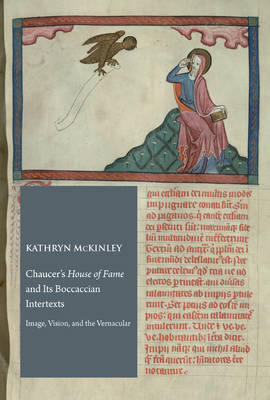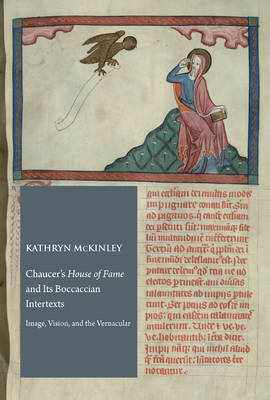
Bedankt voor het vertrouwen het afgelopen jaar! Om jou te bedanken bieden we GRATIS verzending (in België) aan op alles gedurende de hele maand januari.
- Afhalen na 1 uur in een winkel met voorraad
- In januari gratis thuislevering in België
- Ruim aanbod met 7 miljoen producten
Bedankt voor het vertrouwen het afgelopen jaar! Om jou te bedanken bieden we GRATIS verzending (in België) aan op alles gedurende de hele maand januari.
- Afhalen na 1 uur in een winkel met voorraad
- In januari gratis thuislevering in België
- Ruim aanbod met 7 miljoen producten
Zoeken
Chaucer's "House of Fame" and Its Boccaccian Intertexts
Image, Vision, and the Vernacular
Kathryn McKinley
€ 90,10
+ 180 punten
Omschrijving
Geoffrey Chaucer's House of Fame has rightly been read as an ironic response to Dante's Commedia. Chaucer's narrator carries out his dream-journey in realms far from Dante's spiritual geographies: the mural-filled Temple of Venus, the lavishly adorned Palace of the Goddess Fame, and the turbulent, noisy House of Rumour. Chaucer also playfully responds to Dantean motifs with Book Two's eagle-turned-magister, who lectures his passenger, Geffrey, on the properties of sound and language en route to the Palace of Fame. In the end Chaucer's dream vision, with its exploration of the problematics of knowing and the limitations of language, seems to challenge many of the foundational truths of Dante's Commedia. Yet there is a larger story to tell. This study considers how Chaucer's poem engages Boccaccio's writings as much as Dante's. Chaucer's trips to Italy profoundly changed his understanding of poetry, the vernacular, and literary history. The House of Fame, written upon his return, bears the imprint of Dantean imagery and reflects Dante's own passionate commitment to the use of the vernacular. But Chaucer, who translated and adapted Boccaccio's Teseida and Il Filostrato, also deeply engaged the terza rima allegory, the Amorosa visione (c. 1342-3), with its extensive visual poetics of ekphrasis. Itself written as a secularizing love poem, in deeply problematic dialogue with Dante's Commedia, the Amorosa visione forms a central place in Boccaccio's, and later Chaucer's, agonistic relationship with the legacy of Dante. Chaucer's "House of Fame" and Its Boccaccian Intertexts addresses in new ways this broader triangular relationship between Dante, Boccaccio, and Chaucer. Boccaccio's Amorosa visione gave Chaucer a viable model for a response to Dante's theocentric poetics. It valorized earthly love, the vernacular, and the legends of the ancient past even as it over and over again raised the question of indeterminacy.
Specificaties
Betrokkenen
- Auteur(s):
- Uitgeverij:
Inhoud
- Aantal bladzijden:
- 256
- Taal:
- Engels
- Reeks:
- Reeksnummer:
- nr. 206
Eigenschappen
- Productcode (EAN):
- 9780888442062
- Verschijningsdatum:
- 12/12/2016
- Uitvoering:
- Hardcover
- Formaat:
- Genaaid
- Afmetingen:
- 163 mm x 234 mm
- Gewicht:
- 566 g

Alleen bij Standaard Boekhandel
+ 180 punten op je klantenkaart van Standaard Boekhandel
Beoordelingen
We publiceren alleen reviews die voldoen aan de voorwaarden voor reviews. Bekijk onze voorwaarden voor reviews.









